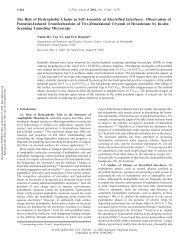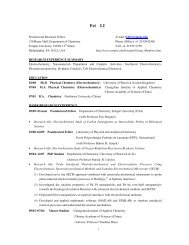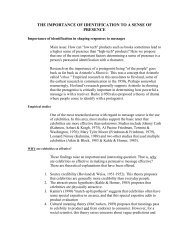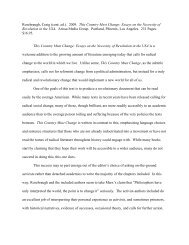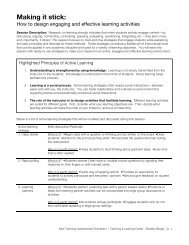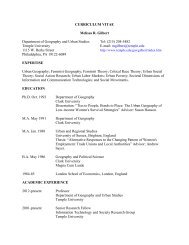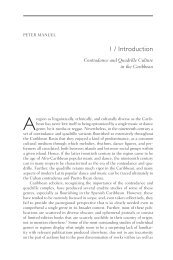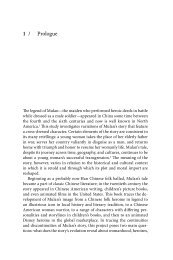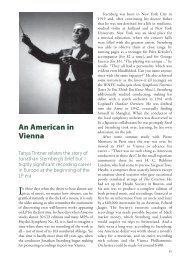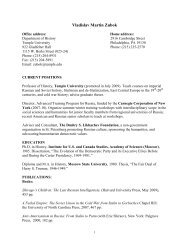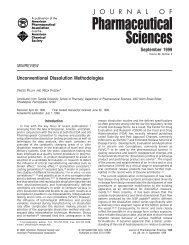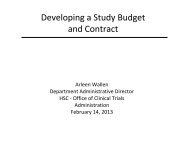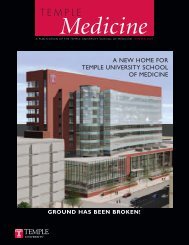TEMPLE IN WEST AFRICA: GHANA - Temple University
TEMPLE IN WEST AFRICA: GHANA - Temple University
TEMPLE IN WEST AFRICA: GHANA - Temple University
You also want an ePaper? Increase the reach of your titles
YUMPU automatically turns print PDFs into web optimized ePapers that Google loves.
THE PROGRAM<br />
<strong>TEMPLE</strong> <strong>IN</strong> <strong>WEST</strong> <strong>AFRICA</strong>: <strong>GHANA</strong><br />
West African Civilization and Aesthetics<br />
Summer 2003<br />
The <strong>Temple</strong> in West Africa: Ghana summer program, tentatively scheduled for July 9 - August 15, 2003, is<br />
intended to investigate aspects of the historical, literary and artistic bases of West African civilization. It offers a<br />
special opportunity for all students interested in classical and contemporary African history, politics, literature,<br />
music, dance and theater to learn about these subjects through academic study and personal cultural experiences.<br />
The program is based at the <strong>University</strong> of Ghana, Legon-Accra. Accra, the capital of Ghana, is one of the<br />
largest administrative and commercial centers in West Africa. The courses are taught by Dr. Abu Shardow<br />
Abarry, Associate Professor of African American Studies at <strong>Temple</strong> <strong>University</strong>, and coordinated by Dr.<br />
Emmanuel Quarcoo, professor of English, at the <strong>University</strong> of Ghana. Courses are supplemented by lectures<br />
given by faculty members from the <strong>University</strong> of Ghana in Legon, the <strong>University</strong> of Cape Coast, and the<br />
<strong>University</strong> of Science and Technology in Kumasi. These three Ghanaian universities are among the most<br />
reputable higher education institutions in West Africa. Students have access to the <strong>University</strong> of Ghana's Balme<br />
Library, the special library of the Institute of African Studies, the DuBois Center, and the Padmore Research<br />
Library, as well as the United States Information Services and the British Council Libraries.<br />
COURSES<br />
Two courses are offered: AAS 315/687 African Aesthetics (3 s.h.) and AAS 378/401 African Civilization (3<br />
s.h.). Both graduate and undergraduate credit can be earned. Students who have already taken these courses or<br />
have special needs due to their major/disciplinary requirements may discuss the possibility of an independent<br />
study with the Faculty Director. Weekly field visits led by faculty to important historical monuments, cultural sites<br />
and commercial enterprises in Ghana enrich the academic program.<br />
The first course, African Aesthetics, seeks to explore the philosophy, culture and aesthetic expressions of<br />
African peoples on the continent and their impact on the communities and artistic expressions of Africans in the<br />
United States and the Caribbean. Readings from textbooks are augmented with lectures, observation and<br />
participation in traditional and contemporary theater and other artistic performances such as oratory, singing,<br />
music, and dance, as well as the arts and crafts of Kente cloth weaving, carving, and batik. The second course,<br />
African Civilization, provides an intensive investigation of the origins of several major African Civilizations from<br />
ancient to contemporary times. Emphasis is placed on the medieval empires of Ghana, Mali and Songhai, the<br />
transatlantic slave trade, the colonial impact, Independence, and contemporary Ghana.<br />
PROGRAM DIRECTOR<br />
The program director, Dr. Abu Shardow Abarry, Associate Professor and Director of Graduate Studies in<br />
<strong>Temple</strong>'s Department of African American Studies, was born in Accra, Ghana. Dr. Abarry received B.A.<br />
(Honors) and M.A. degrees at the <strong>University</strong> of Ghana where he specialized in English and African literatures.<br />
He obtained his Ph.D. degree from the State <strong>University</strong> of New York at Buffalo. Dr. Abarry has taught<br />
English, Communication and African-American Studies at SUNY-Buffalo, the <strong>University</strong> of Nebraska at<br />
Omaha, the <strong>University</strong> of Jos, Nigeria, and the Presbyterian School in Legon, Ghana. He has been an African<br />
language instructor for the United States Graduate Peace Corps Training Program in Ghana, and a Broadcaster<br />
(Ghanaian Languages Department) at the Ghana Radio and T.V. Corporation.<br />
FIELD TRIPS<br />
Students have the opportunity to visit such historic and cultural monuments as the ancient slave castles,<br />
Akosombo (the world’s largest manmade lake) and Bosumtwi (sacred to the Asantes) Lakes, the W.E.B.<br />
DuBois and Kwame Nkrumah Memorials, markets and burial sites, the Homowo (New Year) and other cultural
festival sites, the National Cultural Center, residences of Ghanaian kings, the mysterious, irremovable sword of<br />
Okomfo Anokye, the legendary high priest of the Asantes, and the Obuasi gold mines.<br />
ABOUT <strong>GHANA</strong><br />
The Republic of Ghana, roughly equivalent to Oregon in size, lies almost in the center of the countries bordering<br />
the Gulf of Guinea. To the east lies Togo, beyond which are Benin and Nigeria. On the west is Cote d'Ivoire, and<br />
to the north, Burkina Faso. Ghana's coastline on the south stretches for a distance of about 560 kilometers.<br />
Mountains are few, but there are several hills that rise to a maximum of 900 meters. These include the<br />
Akwapim-Togo ranges that extend from Pokoasi, a few kilometers north of Accra. Formerly a British colony,<br />
Ghana attained independence on March 6, 1957, and became a Republic within the British Commonwealth on<br />
July 1, 1960. Although English is the official and commercial language, several African languages and dialects<br />
are spoken in Ghana, including Twi, Fanti, Ga, Ewe, Dagbani, Hausa, Gonja and Nzima.<br />
Since the attainment of its independence, when the Gold Coast became Ghana, efforts have always been made<br />
to preserve the country's rich cultural history and traditional institutions, which can be traced to the ancient<br />
Ghana Empire. For this reason, the institutions of chieftaincy and the ceremonies attached to it are kept very<br />
much alive. Various ethnic groups hold traditional festivals periodically that include drumming, singing and<br />
dancing. The traditional crafts include Kente and Adinkra, cloth weaving, wood carving, brass and bronze<br />
carving, and pottery. In addition to a rich oral literary tradition which features tales, legends, proverbs and songs,<br />
Ghana has a corps of talented novelists, poets and dramatists such as Kofi Awoonor (formerly Ghana's<br />
Ambassador to the United Nations), Ayi Kwei Armah, Attuquaye Okai, Kofi Aniyidoho, Ama Ata Aidoo, Efua<br />
Sutherland, and Mohamed Ben Abdallah who are making significant contributions to world literature.<br />
ACCRA<br />
Accra is Ghana's capital and largest city. Originally a small fishing village, Accra became the capital of the Gold<br />
Coast in 1877. Probably because of its 300-year contact with the European world, the city was the first to<br />
develop foreign business offices, hospitals, and schools. Luxury items arrived at Accra's docksides before being<br />
transported on to other colonial towns. Modern Accra, with a population of about one million, is the key city for<br />
all of the nation's governmental and business activities. Major roads, airlines, railways, buses and ocean liners<br />
serve the capital, connecting it to most other large cities in Ghana, such as Cape Coast, Takoradi, Kumasi, Keta,<br />
Wenchi and Tamale. Merging with several other coastal towns, Accra has developed into the Accra-Tema<br />
metropolis, forming the country's chief commercial, industrial, and transportation center. The population of this<br />
fast-growing region reached 1.5 million in 1984. The indigenes of this area and their language are called Ga. Dr.<br />
Abarry, the program director, is a native of Accra.<br />
ACCOMMODATION AND STUDENT LIFE<br />
Housing and meals are arranged in comfortable <strong>University</strong> facilities at Legon, and in comparable places for trips<br />
outside of Accra. Although the <strong>University</strong> of Ghana is not normally in session during the summer, the <strong>University</strong><br />
often hosts a number of special summer programs for both local and international participants, and many campus<br />
recreational facilities are available to summer program students.<br />
PREDEPARTURE <strong>IN</strong>FORMATION AND ORIENTATION<br />
Pre-departure mailings are sent to all participants in the weeks prior to departure covering such logistical issues<br />
as transportation, visas, required immunizations, medical care and insurance, as well as suggestions for preparing<br />
participants academically and culturally for the program. Participation in a study abroad program in the<br />
developing world requires ample opportunity for discussion of expectations and concerns. To facilitate such<br />
discussion and to ease adjustment, <strong>Temple</strong> <strong>University</strong> will hold a full-day orientation program at <strong>Temple</strong><br />
<strong>University</strong>'s main campus on July 8, the day before departure. All participants are expected to attend.<br />
Participants from outside of the Philadelphia area are responsible for the costs of accommodation and travel to<br />
Philadelphia. All participants will then travel as a group from Philadelphia to Accra with the program director.<br />
An on-site orientation program will also be held upon arrival in Accra.
PROGRAM FEES AND COSTS<br />
Undergraduate (6 sh) Graduate (6 sh)<br />
PA Resident Non-resident PA Resident Non-resident<br />
Tuition $1,752 $2,916 $2,412 $3,492<br />
Program Fee $ 100<br />
Housing, Meals $ 900*<br />
Local Travel $ 300*<br />
In addition, students will need to budget money for personal expenses, required immunizations (approximately<br />
$400), and health insurance. <strong>Temple</strong> <strong>University</strong> arranges a round-trip group flight from New York to Accra; the<br />
cost is estimated at about $1500. *These are estimated costs.<br />
A limited number of $500 scholarships are available and will be awarded on the basis of academic merit and<br />
financial need. Students must be matriculated <strong>Temple</strong> students in order to be eligible to apply. Application<br />
materials are automatically sent to <strong>Temple</strong> students who are accepted for the Ghana program.<br />
APPLICATION AND ELIGIBILITY<br />
The application deadline is March 1. Early application is encouraged; applications are considered on a rolling<br />
admissions basis. Applications received after the deadline will be considered on a space available basis, and must<br />
be accompanied by the non-refundable $100 program deposit, which will be refunded only if the applicant is not<br />
accepted into the program.<br />
In addition to completing the application form, students are required to submit:<br />
An academic reference from a faculty member.<br />
Official transcripts. All students, including <strong>Temple</strong> <strong>University</strong> students, must submit official transcripts<br />
for all university/college-level work completed to date.<br />
A one-two page typed statement describing your expectations and interests regarding the Ghana<br />
program, and specifying what you ultimately hope to gain from your study abroad experience.<br />
Non-<strong>Temple</strong> students must also submit the home college approval form and a non-refundable<br />
application fee of $30.<br />
When possible, candidates are interviewed; telephone interviews are conducted for those who cannot<br />
be interviewed personally.<br />
Participants must have:<br />
A minimum cumulative G.P.A. of 2.5 on a 4.0 scale, and may not be on academic nor disciplinary<br />
probation.<br />
Although not essential, experience of West African-related subject matter is desirable.<br />
Students will be selected mainly on the basis of their intellectual purpose and emotional maturity; successful<br />
candidates will be notified by March 15. Early application is encouraged; applications are considered on a<br />
rolling-admissions basis. A non-refundable $100 deposit is required for all admitted students in order to reserve<br />
their place, but the amount is credited toward the cost of the program. Students with questions about financial<br />
aid should contact the financial aid office at their home institutions.<br />
For further information, contact International Programs at 215-204-0720, study.abroad@temple.edu or Dr. Abu<br />
Abarry, Department of African-American Studies, <strong>Temple</strong> <strong>University</strong>, 215-204-8496.



